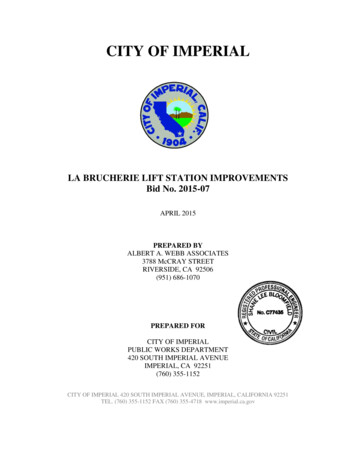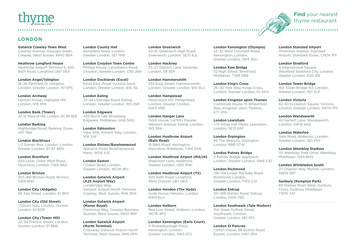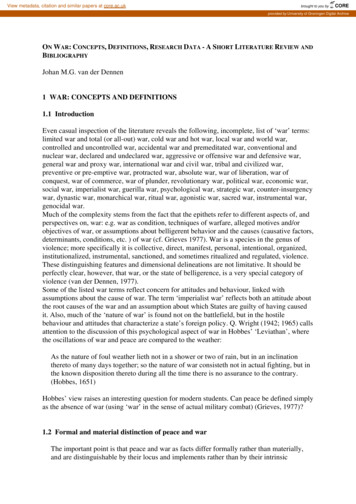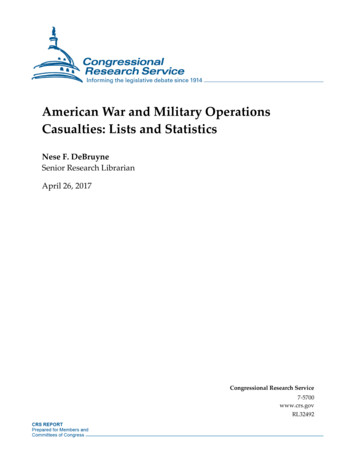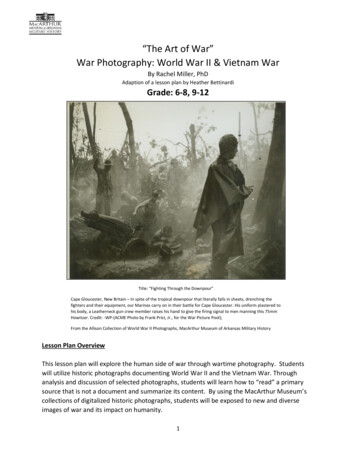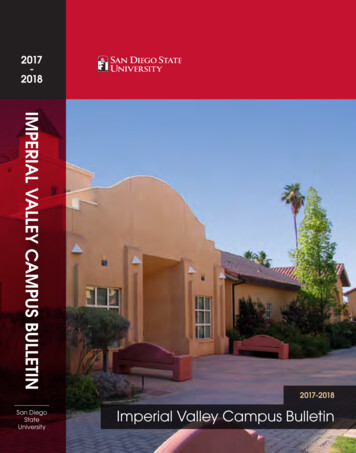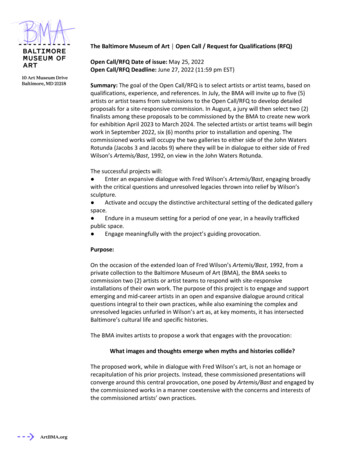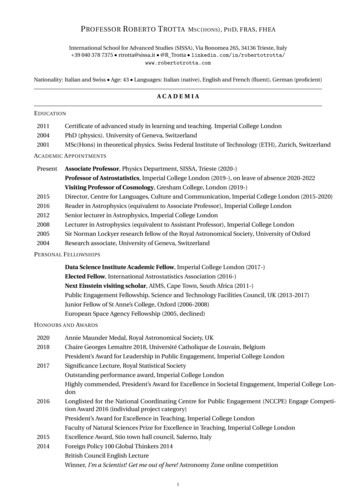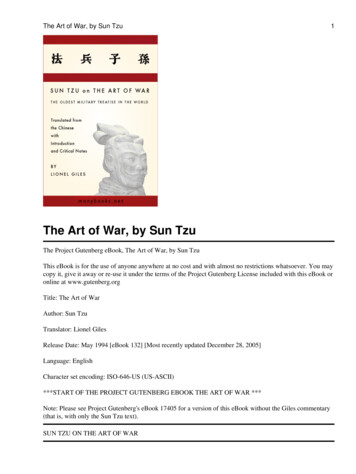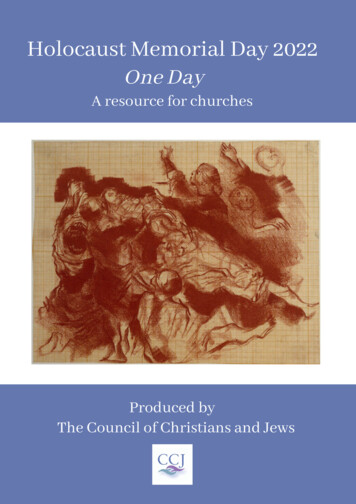
Transcription
Holocaust Memorial Day 2022One DayA resource for churchesProduced byThe Council of Christians and Jews
Cover image: Mary Kessell, ‘Notes from Belsen Camp, 1945’ with permission fromthe Imperial War Museum, London. IWM
ContentsWhat is Holocaust Memorial Day?ForewordsIntroductionOpening WordsPoetryPsalmScriptural ReflectionPrayers of IntercessionLitanyClosing Words and BenedictionOne Day of Prayer‘One Day’ in the life of Jane HainingFurther Reading and ResourcesAcknowledgements
What is Holocaust Memorial Day?The 27th of January is the day for everyone to remember the six million Jewsmurdered in the Holocaust, and the millions of people killed under Nazipersecution, and in the genocides which followed in Cambodia, Rwanda, Bosnia,and Darfur.The 27th of January marks the liberation of Auschwitz-Birkenau, the largest Nazideath camp.In the UK, thousands of local events and activities take place every year – each onean opportunity for people to reflect on those whose lives were changed beyondrecognition, and to challenge prejudice, discrimination, and hatred in our ownsociety today. On HMD, we all have a role to play to ensure that we learn thelessons of the past, to create a safer, better future.In 2022, the theme for HMD is ‘One Day’. This resource draws on this theme inthe prayers, readings, and reflections.How to use this resourceThis resource is produced by the Council of Christians and Jews (CCJ) with thesupport of the Holocaust Memorial Day Trust (HMDT). It is designed for use byChristians in a worship setting on Holocaust Memorial Day or a Sunday close toHolocaust Memorial Day. It is not a complete service liturgy, but it includes asuggested liturgy for an act of commemoration within Christian worship.Commentaries are provided on the readings set for Sunday 23 January 2022,referencing the theme for Holocaust Memorial Day 2022: ‘One Day’.The resource can be adapted as necessary for your own context however, it ishoped that it will provide inspiration and guidance so that church communities canremember the Holocaust, Nazi persecution, and subsequent genocides as afundamental part of their Christian witness and discipleship.
ForewordIt is terribly difficult for us to imagine that a civilised and advanced nation coulddevolve into the atrocities that Nazi Germany did during the Second World War.But it is not the first time this has happened in human history and, if we do not facethe reality of its potential within us, it will not be the last. Jewish teachings tell usthat we can master these more primal elements, but never eradicate them.There are many reasons why humanity must always remember the Holocaust.Faith communities in particular do well to mark and remember it because it reaffirmsfor us just how precious and meaningful our religious teachings and moral practicesare for our lives. One of the chief teachings that both Jews and Christians share isthat all human beings are created in God’s image (Gen. 1:2) and that the breath ofGod becomes the soul of man (Gen. 2:7). The divinity and sanctity of every humanlife is at the heart of our religious worlds.CCJ has been a stronghold and guide in the post-war and modern era for ourshared religious values. And as we remember the victims of the Holocaust we alsoremember the special Gentiles whose spiritual and moral core outshined thedarkness, as they saved the lives of their Jewish neighbours, countrymen, and fellowhuman beings — even in the face of mortal danger. It is a further reminder to us allthat cultivating our spiritual and religious lives in prayer, study and moral refinement,is to nourish and enhance the divine spirit—the breath of God, in each and everyone of us. In this attention and cultivation, we rein in the darker inclinations that lielatent within the human being and choose to govern our hearts with God’s spiritand word.I do hope that this resource will be a useful aid to your church or communitygroup in marking this important day.Rabbi Joseph DweckSenior Rabbi of the S&P Sephardi Community of the United Kingdom
ForewordIt is a privilege to be invited to write a forward for the Holocaust Memorial Dayresources for 2022.I am writing this introduction in the week that marks 80 years since one of the worstmassacres of World War Two. At least 34,000 Jews were rounded up and killed bythe Nazis at the ravine of Babyn Yar, in the Ukrainian capital Kyiv in just two days.Forgetting the terror of those women, men and children and their communities, orminimizing the magnitude of the atrocity of the massacre and failing to learn fromit, and be transformed by it, is to add to the suffering of the Jewish people. Whenconsidering the power of memorial I have found it helpful to read the writing ofsome Jewish contemporary writers who are asking in the light of the Black LivesMatters movement, following the deaths of George Floyd and Breanna Taylor,whether the traditional phrase commonly used following the death of a person, “mayher /his/their memory be a blessing” is always sufficient. What about an alternativephrase, “May her memory, his memory, their memory, be a revolution”? RachelStomel has commented that in the context of domestic violence there may benothing blessed about the way some lives were, or are, ripped away from us.Holocaust memorial calls for identifying and confronting the deep-seated conditionsthat gave rise to extermination on such a scale, deliberately dismantling them, andthen generating active justice in their stead. Remembrance should not be only aninterior reflexive, passive process. To remember the past effectively involvesworking to create and embed lasting change in us in the present. Holocaust memorialshould be a public witness that leads to a commitment to vigilance in order thathatred and the development of ideologies which reduce the sacredness of humanbeings to less than that, are challenged and opposed. So in advocating for, acting andliving in solidarity with our Jewish siblings you are invited to pray using the prayersand liturgies within this resource on at least one day of prayer and reflection on issuesrelated to the Holocaust. As preachers and worship leaders we can encourage andinspire others to remember the Holocaust, to resist evil and hate in our communitiesand nation, and to work for peace with justice.Rev’d Helen Cameron,Moderator-elect, Free Churches Group, and President-elect, Churches Together in England.28th September 2021
IntroductionIt is hoped that this resource will be a helpful aid to observing Holocaust MemorialDay 2022 in your own church context. The theme of ‘One Day’ immediately makesme think of hope; that one day, genocide will be no more, and the peace of God willprevail. Indeed, this is something which Revd Dr Tollington draws attention to inher Scripture reflection in this resource. However, hope is a complex emotion tospeak of in relation to the Holocaust, as for many victims the extent of the traumarendered it hopeless. This is picked up powerfully in the poetry of Elie Wiesel.The cover image for this resource is an artwork by Mary Kessell entitled ‘Notes fromBelsen Camp, 1945’ which draws out some of the complexities of hope and theHolocaust. In her work, Kessell documented life in Belsen, four months after itsliberation. In her diary she observes people beginning to live again, laughing andsinging. In Kessell’s snapshot of one day in the camp, there is certainly hope, andundoubtedly the intense relief of survival. Yet, there is also the memory of thetrauma of the Holocaust. We see a paralysed figure in the group, alongside peoplewhose faces are blurred into obscurity. In the centre, an out-stretched arm reachesto the sky, crying for help, perhaps, for her fellow survivors.Even though the Holocaust is now a memory, we must still cry out, like the figurein the centre of this image. We must reach out to remember the victims who werekilled in the Holocaust and genocides. In doing so, we must give voice to theirmemory. And we must seek the same solidarity that we see here – a crying out fromthe midst of the crowd, speaking for those who cannot speak. This is vital work, inthe context of growing antisemitism, the continuing prevalence of Holocaust denial,genocide, and religious persecution.In light of this, we encourage you to observe ‘One Day of Prayer’ on 27th January;to reach out to God, bringing before Him the memory of the victims of genocide,and praying that one day this is no more. You can use the prayer which is includedin this resource for that purpose. In addition, in this resource you will find materialswhich can be used in a liturgy of remembrance, written by contributors from acrossthe UK and from a variety of Christian denominations. There are poems, anexposition on the Scripture readings for the Sunday preceding HMD (Sunday 23rdJanuary), prayers, a litany written by members of CCJ’s Yad Vashem Alumni Group,and finally a reflection on one day in the life of Jane Haining; a Scottish RighteousAmong the Nations. CCJ are extremely grateful to all the writers who havecontributed to this resource, who are named in the acknowledgements section.James RobertsChristian Programme Manager, CCJ
Opening wordsGod of mercy,on this day, this one day, we come into your presencein darkness and in lightaware of what has happened in days past,in darkness and in lightconscious of what people experience todayin darkness and in lighttrusting that you will guide your world in every day to comein darkness and in light.Prayer of confessionGracious God,on this one day,we call to mind other days,days of action and inaction,days of injury and loss.We are conscious of the darkest days and years,when so many lives were cut short by hatred;suffering which continues today.We recognise the ways we have faltered in faith,thinking less of others because they look different, sound different,feel in ways we will not imagine.We confess these and all our sins this day.May God who is rich in mercy,forgive us todayand inspire us to live fully in every day to come,in friendship and solidarity with all people and the whole of creation.In Jesus’ name,Amen.
Psalm 19The heavens are telling the glory of God;and the firmament proclaims his handiwork.2Day to day pours forth speech,and night to night declares knowledge.3There is no speech, nor are there words;their voice is not heard;4yet their voice goes out through all the earth,and their words to the end of the world.1In the heavens he has set a tent for the sun,5which comes out like a bridegroom from his wedding canopy,and like a strong man runs its course with joy.6Its rising is from the end of the heavens,and its circuit to the end of them;and nothing is hid from its heat.The law of the Lord is perfect,reviving the soul;the decrees of the Lord are sure,making wise the simple;8the precepts of the Lord are right,rejoicing the heart;the commandment of the Lord is clear,enlightening the eyes;9the fear of the Lord is pure,enduring forever;the ordinances of the Lord are trueand righteous altogether.10More to be desired are they than gold,even much fine gold;sweeter also than honey,and drippings of the honeycomb.7Moreover by them is your servant warned;in keeping them there is great reward.12But who can detect their errors?Clear me from hidden faults.13Keep back your servant also from the insolent;do not let them have dominion over me.11
Then I shall be blameless,and innocent of great transgression.14Let the words of my mouth and the meditation of my heartbe acceptable to you,O Lord, my rock and my redeemer.PoetryNever Shall I Forget, Elie WieselNever shall I forget that night, the first night in camp, that turned my life into onelong night seven times sealed.Never shall I forget that smoke.Never shall I forget the small faces of the children whose bodies I saw transformedinto smoke under a silent sky.Never shall I forget those flames that consumed my faith for ever.Never shall I forget the nocturnal silence that deprived me for all eternity of thedesire to live.Never shall I forget those moments that murdered my God and my soul andturned my dreams to ashes.Never shall I forget those things, even were I condemned to liveas long as God r-shall-i-forget-by-elie-wiesel/Terezin, Michael FlackThat bit of filth in dirty walls,And all around barbed wire,And thirty-thousand souls who sleepWho once will wakeAnd once will seeTheir own blood spilled.I was once a little child,Three years ago.That child who longed for other worlds.
But now I am no more a childFor I have learned to hate.I am a grown-up person now,I have known fear.Bloody words and a dead day then,That’s something different than boogie men!But anyway, I still believe I only sleep today,That I’ll wake up, a child again,and start to laugh and play.I’ll go back to childhood sweet like a briar rose,Like a bell which wakes us from a dream,Like a mother with an ailing childLoves him with aching woman’s love.How tragic then, is youth which livesWith enemies, with gallows ropes,How tragic, then, for children on your lapTo say: this for the good, that for the bad.Somewhere, far away out there, childhood sweetly sleeps,Along that path among the trees,There o’er that houseWhich was once my pride and joy.There my mother gave me birth into this worldSo I could weep In the flame of candles by my bed, I sleepAnd once perhaps I’ll understandThat I was such a little thing,As little as this song.These thirty-thousand souls who sleepAmong the trees will wake,Open an eyeAnd because they seeA lotThey’ll fall asleep again l-flack/
Scriptural ReflectionBased on Nehemiah 8:1-3, 5-6, 8-10 and Luke 4:14-21The compiler of Nehemiah 8 seems to have conflated two separate readings of thebook of the law (8:1-3 and 8:5-8) into a single occasion taking place on the first dayof the seventh month (Tishri in the Jewish calendar), which is Rosh Hashanah, akinto New Year’s day. The text (v.9) also brings together two characters, Ezra the priestand Nehemiah the governor, who may not have been active at the same time as eachother. As readers our focus is being directed to one specific day, a day holy to theLord, a day that should be one of joyful celebration, when priest, politician andpeople are all confronted by the challenges contained within the word of God.The text indicates that the people wept in response to the reading of the law– due to a sense of inadequacy perhaps. Or maybe as an act of repentance, as theyrecognized their failure to keep the covenant commands, once their implication hadbeen made clear by skilled interpreters. But this isn’t the response that God requires,they are told. Instead be joyful, celebrate a feast, in thanksgiving to God for all yourblessings and for the strength that God gives you – and, by the way, share your feastwith those who have nothing prepared, or nothing with which they could feast.Be joyful in the Lord and share your joy with others – not in denial of yourown failure, shortcomings, or sense of inadequacy towards God; but in hope of thenew future that is possible when God’s people recommit to walking in God’s ways.One specific day on which the whole community focused on God, reflected withgrief on events of the past; but were told to move forward joyfully and with hope.That seems to be an appropriate message for Holocaust Memorial Day, for Jews andChristians alike, whereby our remembering of past genocides doesn’t leave uswallowing in sorrow, grief or shame but spurs us forward into another year; and intopositive action that can bring joy and hope to us and into the empty lives of others.Luke 4:14-21 is similarly about one specific day in the story of Jesus when thereading of God’s word (Isaiah 61:1-2a) in the synagogue and his application of thosewords to himself had a radical effect on his audience. That one day marked the startof Jesus’ ministry but sadly also the beginning of what would gradually divide us.However, those words from Isaiah continue to be good news for all God’s people,offering hope in the face of injustice or oppression; and assuring us that this year (asevery year) is the year of the Lord’s favour.Holocaust Memorial Day is one specific day when we can determine to healdivisions and to walk together joyfully into the future with God, guided by God’sword, with a shared commitment to build a world of peace and joy in which the fearof genocide is no more.Revd Dr Janet E Tollington
Prayers of IntercessionWe remember this day all those who have suffered and been murdered as a resultof genocide, hatred and abuse. May we honour their pain, hold them in our heartsand take action for a better future so that one day there will be no more genocide,no more war, no more hatred and division among us.May the words of our mouth and the desires of our hearts find favour in your sight OLordWe remember, this day, our Christian community. May we be enriched by itsdiversity, united in its faith, pained by its failures, supported by its strengths as westruggle to be faithful to our mission to witness to a life of love, mercy, hope andservice in our world today.May the words of our mouth and the desires of our hearts find favour in your sight OLordWe recognise and rejoice in our common humanity that unites us with ourbrothers and sisters past, present and to come. May we be ever mindful of theprecious gift of life and be aware of the great dignity of our vocation to be lifegivers, helping the human family further in its journey into fullness of life in Christ.May the words of our mouth and the desires of our hearts find favour in your sight OLordWe recognise and rejoice in this earth that gives us life and sustenance. Weacknowledge our interconnectedness with all living things and our dependence onthe natural world around us. May we appreciate the mystery of life and learn totreat the earth on which we walk with reverence and respect.May the words of our mouth and the desires of our hearts find favour in your sight OLord
Let us for a moment, feel the suffering and pain that we humans have and stillinflict on one another, the abuse and disrespect that we have for the natural world.Let us feel too the goodness and energy of all those who are working for its healingand the overcoming of divisions between people. Let us send out our own lovingenergy and healing to them as we pray:'May the Lord bless you and keep you. May the Lord let his face shine uponyou and be gracious to you. May the Lord uncover his face to you and bringyou his peace'. Amen.LitanyOne day, may our hearts be open to the suffering of others.May your Kingdom come, O Lord.One day, may our nations strive for unity, not division.May your Kingdom come, O Lord.One day, may truth triumph over lies.May your Kingdom come, O Lord.One day, may we celebrate our common humanity, made in the image of God.May your Kingdom come, O Lord.One day, may there be joyful celebration of our differences.May your Kingdom come, O Lord.One day may our shared stories, of suffering and pain, of light and life; be heldtogether with the threads of our neighbours, our neighbours who are not like us,but who bring difference and challenge to us.May your Kingdom come, O Lord.One day, may I see the needs of others and put them before my own.May your Kingdom come, O Lord.One day, may our darkest moments be swaddled by your light.May your Kingdom come, O Lord.Help us to live, this day, in the light and truth of Your love, bringing yourKingdom to earth. Amen.
The Lord’s PrayerParticipants are invited to pray the Lord’s Prayer together in whatever version ismost suitable.A short time of silence is observed.Closing PrayerAs we go from this house of prayer into a world of challenge and changeWe remember the pain of the past.As we obey God’s commandments and follow Christ’s way,We recognise life’s need for love.As we seek the truth and glimpse God in all people and all places,We go, to make the world a home for everyone.Amen.BenedictionMay we go in peace,Holding the memory of others in our hearts,Firm in the knowledge of the grace, hope and love of God.Amen.
‘One Day of Prayer’To mark Holocaust Memorial Day, and to reflect the theme of ‘one day’, CCJ areencouraging people to observe ‘one day of prayer’ on 27th January 2022; todedicate space during the day to approach God in prayer, privately or corporately,to remember the victims of genocides around the world.To help dedicate some time during the day to prayer, CCJ have produced thefollowing words. These can be said at home, during a service, or shared withcongregants to reflect upon. However you might pray, we hope you may be able todedicate some time on 27th January to prayerfully remember the victims of theHolocaust, and to petition God for an end to such human atrocities.The ‘One Day’ PrayerEternal God, you hold all of our days in your hands.On this day, we come before you to remember the victims of the Holocaust.We lament the loss of the six million Jews who were killed in the Holocaust, themillions of other victims of Nazi persecution, and other genocides.May our minds be clear and attentive to their memory and our hearts be moved tobear witness to their lives.Today, help us to remember and recognise the sanctity of each human life, that allpeople are made in Your image.One day, we pray that genocide and hatred will be no more, and that love willtriumph over evil.In our prayers and in our actions, help us to show this love in the world today.Amen.
12th May 1944:One Day, Jane HainingMary MillerJane Haining (1897-1944) was a Scottish woman livingand working in Hungary during World War II. She isrecognised as one of the Righteous Among the Nations forher solidarity with her Jewish students.Jane Haining, the Matron of the Girls’ Hone at the Scottish Mission School inBudapest, was arrested by the Gestapo on 24th April 1944 on a series of trumped-upcharges. She was kept briefly in Fo utca Prison, the City Jail.At 5 am on 12th May, dawn came late through the narrow window of the cell wherethe women lay trying to sleep. Crash! Bang and a jangle of keys as the heavy doorswung open and at once the women were wide awake, anxiety forcing them boltupright.“Haining!” shouted the two guards. “Hurry up, you’re leaving!”Jane and Frances, who had been sleeping side by side, for a moment stared wildly ateach other – confusion, terror, hope. Then Jane and a few others stumbled to theirfeet. “Your clothes – your things!” A frantic search began, women pulling togetherthe few garments that were known as Jane’s. A scene flashed through Jane’s mindof two nights before when she had made the women dress up in all the clothes theyhad and put on a fashion show, which she compered in faultless German until theyall rocked with laughter. But there weren’t many clothes left. “I gave my better thingsto Szuszi for court today – I’ve only this. Oh – the ham!” Remembering, Janegrabbed the piece of ham that Louis and Szofi had managed to hand in for heryesterday. It had so preciously evoked the Mission, the School, the beloved girls forwhom she cared. She tried to pull off a small piece and leave the rest with hercellmates but Frances pushed it back at her. “No, Jane, no – you might need it.”“Hurry up, hurry up,” shouted the guards. “Where is she going?” demanded one ofthe other women. “Ha!” sneered the guard, “She’s going where she’ll be happy,because she loves Jews so much.”“She’s going somewhere better”, the women comforted each other, “they knowshe’s not like us”. In the jumble of Jane’s mind a flash of hope, instantly followedby a wave of shame that she should even contemplate special treatment. It was alltoo quick – no time to think – a guard, still shouting was dragging at her arm. No
time to sit with Frances and read the Psalms, which had become their daily comfort.No time to pray, except “Oh God, oh God, be with me, be with the women andkeep them safe.”They dragged her out; the door was slammed and locked. Devastated, Frances staredaround the cell – then leapt into action. ‘Jane! Jane! You left your hairbrush, youwere drying it at the window ’ No response from beyond the massive door. Noreturn.Jane breathed the air on the short drive from the prison to the railway yard. Shelooked around; she saw the sky. Then, “Dear God, these look like cattle trucks.” Theshoved her in; and the train pulled out, for Auschwitz (where, of course, she wouldnot need her hairbrush).
AcknowledgementsWith thanks to:Rabbi Joseph Dweck, Senior Rabbi of the S&P Sephardi Community of the UnitedKingdom, for the Foreword.Revd Helen Cameron, Moderator elect Free Churches Group and President electChurches Together in England, for the Foreword.Revd Dr Donald MacEwan, Chaplain to the University of St Andrews, for theopening prayer and confession.Revd Dr Janet E Tollington, a retired minister in the United Reformed Church,for the Scriptural Reflection.Sr Isabel Smyth OBE, Scottish Catholic Bishops Secretary for Interfaith Relations,for the prayers of intercession.Members of the Yad Vashem Alumni Group, for the Litany which was writtencollectively during an alumni seminar with the Holocaust Memorial Day Trust.Mary Miller, Biographer of Jane Haining and author of ‘Jane Haining: A Life ofLove and Courage’, for writing the reflection on Jane Haining.The Imperial War Museum for permission to use the cover image.The closing prayer has been reproduced from CCJ’s HMD Resource in 2019.Further ResourcesFor more information about CCJ, our work and other resources, please seewww.ccj.org.uk.Holocaust Memorial Day Trust: www.hmd.org.uk/resourcesYad Vashem: www.yadvashem.orgWhatever you are planning for Holocaust Memorial Day, please let us know atcjrelations@ccj.org.uk and/or share your event with HMDT directly on rt-in-holocaust-memorialday/activities-form/
Produced byThe Council of Christians and JewsThe Council of Christians and JewsFaith House7 Tufton StreetLondon, SW1P 3QBwww.ccj.org.uk020 3515 3003 cjrelations@ccj.org.ukfacebook.com/TheCCJUK @CCJUKIn association withThe International School of Holocaust Studies,Yad Vashem
In 2022, the theme for HMD is 'One Day'. This resource draws on this theme in the prayers, readings, and reflections. How to use this resource This resource is produced by the Council of Christians and Jews (CCJ) with the support of the Holocaust Memorial Day Trust (HMDT). It is designed for use by


